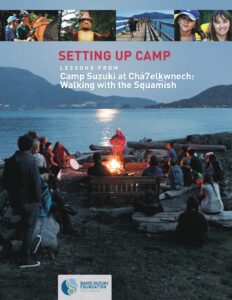Beginning in 2008, Canada as a nation began a Truth and Reconciliation Commission related to the tragic and painful history of residential schools and its terrible impact upon the children, the survivors and all indigenous peoples in that country. In all, there were 94 Calls to Action, many of which called for acknowledgement, reparation, compensation and healing. In 2021, further truth in the form of the discovery of mass graves of undocumented children at several former residential schools added further pain to indigenous communities and to all Canadians trying to come to terms with their history and meaningful reconciliation.
Murray Sinclair, Chair of the Truth and Reconciliation, points to education as one key to reconciliation. “Education got us into this mess, and education will get us out of this mess”.
Camps in Canada have always had a responsibility in the areas of justice, equity, diversity and inclusion and many camps are now examining how camps can address their own histories of perpetuating stereotypes and misinformation about indigenous people through their programs and infrastructure. The Canadian Camping Association under the direction of Dr. Stephen Fine has been looking for ways to participate in the discussions in meaningful ways and to support a solid, legitimate relationship with indigenous communities so that camps can assume an appropriate place in the education of our youth (indigenous and non-indigenous) and in the healing of individuals, communities and society as a whole.
One particular project has been undertaken in British Columbia, Canada. Since 2015, the David Suzuki Foundation, Squamish Family and Children’s services (Ayas Menmen), the Squamish Nation and Camp Fircom have worked together to offer camps on beautiful Chá7elkwnech: (Gambier Island) in British Columbia’s Atl’ka7tsem (Howe Sound). A recent report: Setting Up Camp Lessons from Camp Suzuki at Chá7elkwnech: Walking with the Squamish outlines the methods, importance, and benefits of ‘getting it right’.
The CCA and indigenous moderator Justice Jacinto of the David Suzuki Foundation are seeking interested camp professionals to participate in a webinar in February 2022. It will include practical camp schedules highlighting how Squamish/Indigenous Suzuki-based programs can be integrated into a variety of camp settings and populations.
For expressions of interest across ICF, more information and participation in the webinar series, please reach out. sfine@alumni.utoronto.ca or jjacinto@davidsuzuki.org
